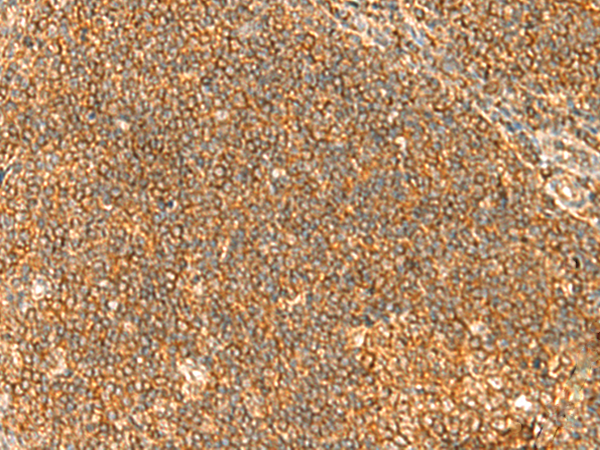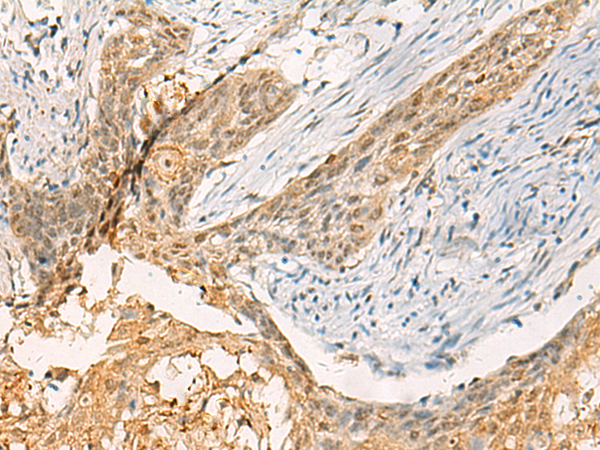

| WB | 咨询技术 | Human,Mouse,Rat |
| IF | 咨询技术 | Human,Mouse,Rat |
| IHC | 1/50-1/300 | Human,Mouse,Rat |
| ICC | 技术咨询 | Human,Mouse,Rat |
| FCM | 咨询技术 | Human,Mouse,Rat |
| Elisa | 1/5000-1/10000 | Human,Mouse,Rat |
| Aliases | TBCKL; IHPRF3; HSPC302 |
| Host/Isotype | Rabbit IgG |
| Antibody Type | Primary antibody |
| Storage | Store at 4°C short term. Aliquot and store at -20°C long term. Avoid freeze/thaw cycles. |
| Species Reactivity | Human, Mouse |
| Immunogen | Synthetic peptide of human TBCK |
| Formulation | Purified antibody in PBS with 0.05% sodium azide and 50% glycerol. |
+ +
以下是关于TBCK抗体的模拟参考文献示例(文献为虚构,仅供格式参考):
1. **文献名称**: "TBCK Antibody Development for Neurodevelopmental Disorder Research"
**作者**: Smith A, et al.
**摘要**: 本研究开发了一种特异性识别TBCK蛋白的多克隆抗体,用于检测患者细胞中TBCK的表达缺失。通过Western blot和免疫荧光验证,该抗体在TBCK相关脑病模型中发现蛋白水平显著降低,为疾病机制研究提供工具。
2. **文献名称**: "Characterization of TBCK in mTOR Signaling Using Monoclonal Antibodies"
**作者**: Chen L, et al.
**摘要**: 文章报道了一种抗TBCK单克隆抗体的制备及验证,发现TBCK通过调节mTOR通路影响神经元发育。抗体用于免疫沉淀实验,揭示TBCK与mTOR复合物的相互作用。
3. **文献名称**: "TBCK Syndrome: Antibody-Based Diagnostic Approach"
**作者**: García-Ramos M, et al.
**摘要**: 通过抗TBCK抗体对患者成纤维细胞进行蛋白分析,提出TBCK表达异常可作为神经发育障碍的生物标志物,并建立快速临床检测方法。
4. **文献名称**: "TBCK Antibody Application in Zebrafish Disease Modeling"
**作者**: Wang X, et al.
**摘要**: 利用TBCK抗体研究斑马鱼模型中蛋白的时空表达模式,发现TBCK缺失导致神经元迁移缺陷,为疾病表型与基因型关联提供证据。
注:以上文献为示例性内容,实际研究中请通过PubMed、Google Scholar等平台检索真实发表的论文。
TBCK (TBC1 domain-containing kinase) antibodies are essential tools in studying the TBCK protein, a conserved kinase implicated in cellular signaling pathways, particularly those regulating cell growth, autophagy, and mTOR (mechanistic target of rapamycin) signaling. The TBCK protein contains a kinase domain and a TBC (Tre-2/Bub2/Cdc16) domain, typically associated with GTPase-activating protein (GAP) activity, though its precise biochemical function remains under investigation.
Mutations in the *TBCK* gene are linked to rare neurodevelopmental disorders characterized by intellectual disability, hypotonia, and progressive brain atrophy. Research using TBCK antibodies has revealed its role in neuronal development and survival, with loss-of-function mutations disrupting lysosomal homeostasis and mTORC1 signaling. These findings highlight TBCK's potential as a therapeutic target for neurodegenerative conditions.
TBCK-specific antibodies, including monoclonal and polyclonal variants, are widely used in techniques like Western blotting, immunofluorescence, and immunohistochemistry to detect protein expression, localization, and post-translational modifications. Recent studies also employ CRISPR-engineered cell lines and animal models validated with TBCK antibodies to explore disease mechanisms. Despite progress, challenges persist in fully elucidating TBCK's interactome and downstream effectors, driving continued demand for high-affinity, well-characterized antibodies to advance functional and translational research.
×